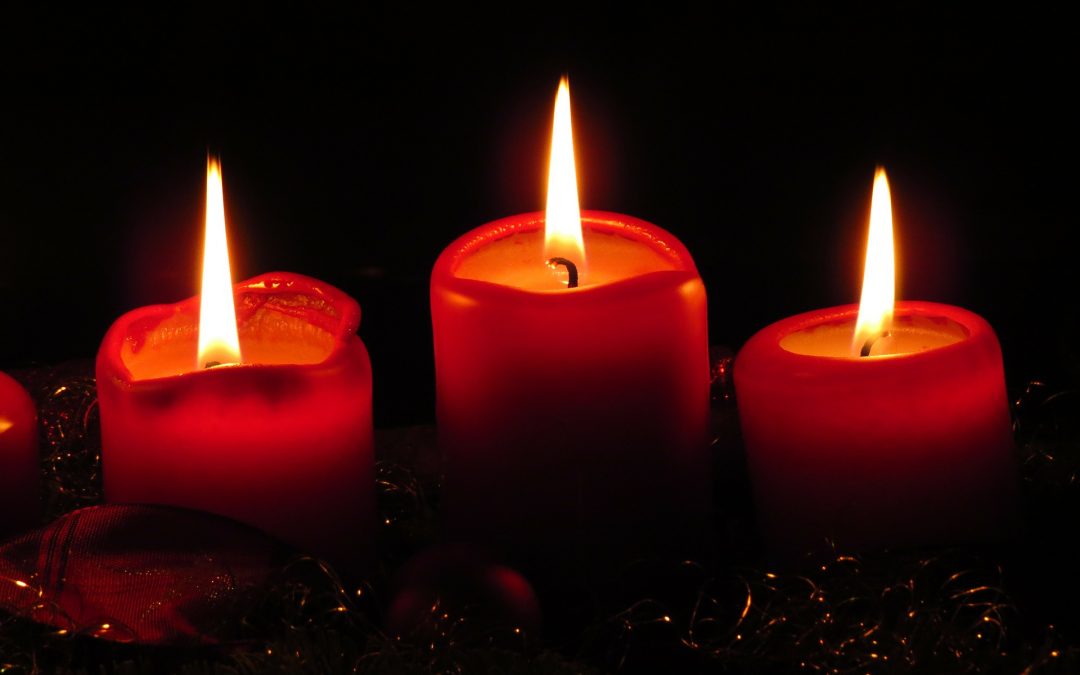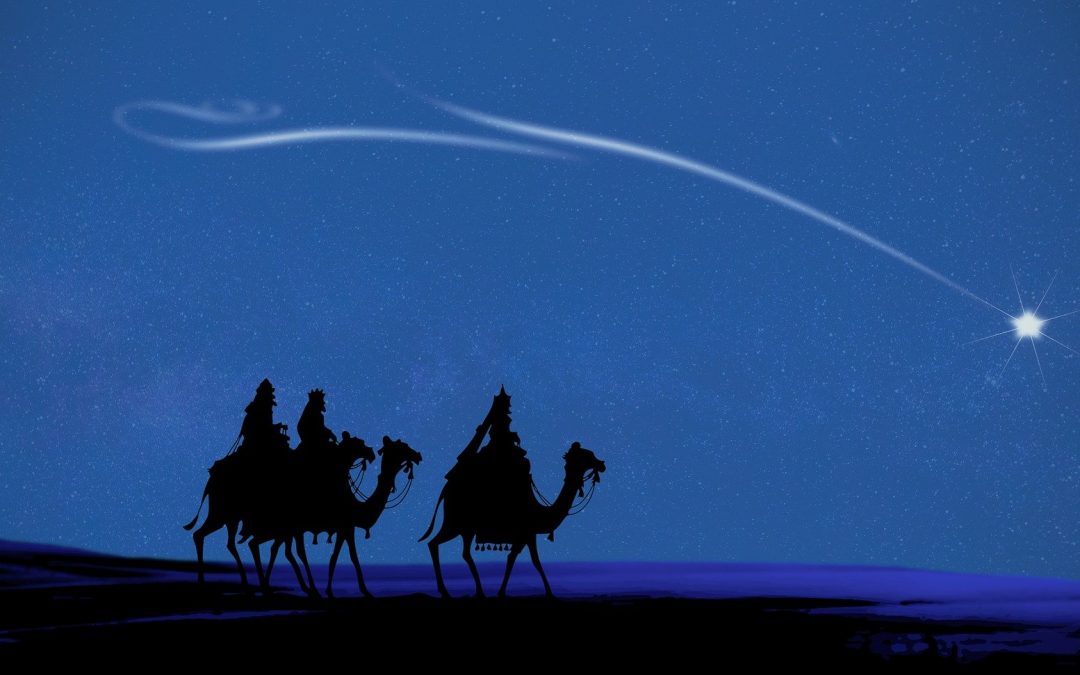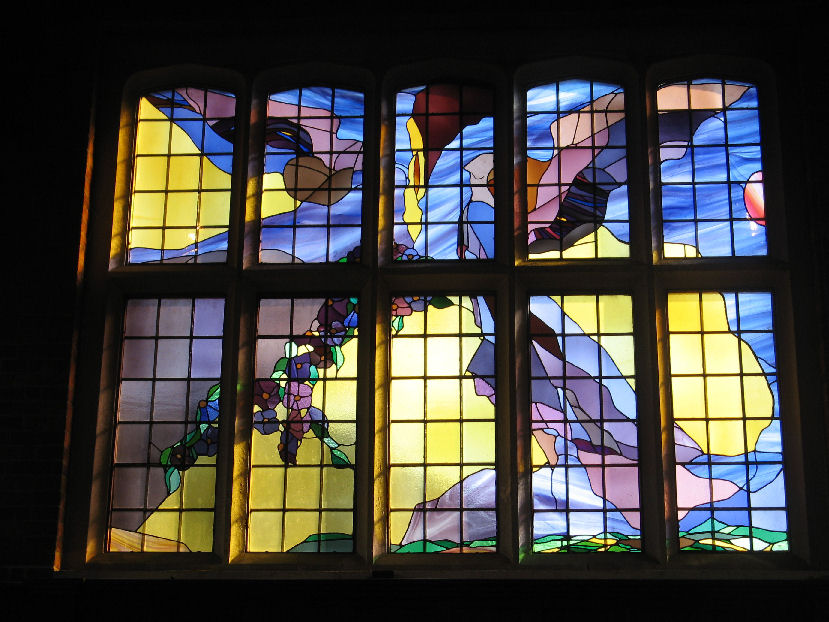
by church news | Dec 27, 2020 | Front Page, Sermons
Revd Sister Margaret Anne McAlister
We worship a very adaptable God. For two days ago on Christmas Day, the holiest of days, we celebrated the great mystery of God in Christ taking on human flesh. The great and awesome God of the universe adapted to a frail creation, humanity, and out of immense love for us became one of us in the form of a baby born in Bethlehem over 2,000 years ago. The Christmas story is full of strangeness and wonder. There are angels and shepherds and oriental kings and a bright star. It’s all the language of fairy-tale. And yet the message behind the story is quite the opposite of fairy-tale. It’s about how God, the all transcendent God, gets totally involved and immersed and engaged in creation. It’s a story about an incarnational God who gets involved in the mess. Thanks to a very adaptable and hard-pressed inn-keeper, when there is no room at the inn, Mary is enabled to give birth to her child in an ordinary stable, among hot-breathed animals and straw.
Humankind is a strange mixture of the heroic and the terrible. In a fit of melancholy Shakespeare’s Hamlet perceives this strange dichotomy in human nature:
“What a piece of work is man! How noble in reason! How infinite in faculties!….In action, how like an angel!….And yet, to me, what is this quintessence of dust?”
Here indeed is a strange paradox. For humankind is capable both of great acts of heroism and also murderous acts of terrorism. In the incarnation of Christ that we celebrate in this Christmas season God out of love for us all takes on full responsibility for the waywardness of creation. God adapts to humanity totally by taking on our flesh and in Jesus becoming one of us. Like God and the inn-keeper, we too are called to be adaptable. And how supremely true that has been in this year of global pandemic. We have all had to change and adapt to so much in 2020. We have had to adapt to observe social-distancing, to wearing face masks, to the idea of working more from home, to severe restrictions being imposed on our lives, including our normal freedom of movement. This Christmas many have been observing the festival apart from their loved-ones, and many have had to keep the festival alone. Tragically for so, so many this Christmas has been laden with grief due to the death of loved ones, particularly from Covid 19.
We live in a changed world. But there has been much that has been good. There have been so many countless acts of kindness and generosity, especially to the most vulnerable in our society. And the NHS and health-care professionals working in hospitals, care-homes, hospices and in the community have shown selfless dedication of heroic proportions. We are so grateful for all key-workers of any kind in these supremely difficult and challenging times. We may live in changing circumstances… we may be far on in life’s journey and feel the burden of failing powers and increasing infirmity. God – the incarnational God – is our model. God adapted supremely to our condition by becoming one of us. We too are called to be open to our circumstances, our surroundings, the people we encounter….to be open, flexible, adaptable…..
In our gospel reading today from Luke, (chapter 2, 15-21) we are given a picture of the Holy Family – Mary, Joseph and the baby Jesus – being visited by some local shepherds. The shepherds have witnessed the wonderful angelic announcement of Christ’s birth, and they share their joy with Mary and Joseph and worship the new-born child. After the shepherds have left Luke tells us of how, when the child was just eight days old, it was the customary time for him to be circumcised according to the Jewish law, and for him to be given a name. He was given the name announced by the angel at his conception: Jesus, meaning “Yahweh saves” : God saves. It is at the very heart of God’s nature to save, to deliver, to rescue, to bring good from evil. We can as Christians be confident that even throughout this time of global pandemic, God’s loving redeeming power is at work among us.
Today is not only the First Sunday of Christmas. It is also, on this 27th December, the feast day of St John, Apostle and Evangelist. So today the Church celebrates and gives thanks to God for the life, witness and works of St John. Modern scholars have often debated John’s identity and authorship as regards references to him in the New Testament writings – raising questions as to who was the true author of texts attributed to him. Whatever the answers to these scholarly debates may be, we can be confident that there really was a close follower of Jesus called John and that he witnessed to the truth of Jesus as God in the flesh – “the Word became flesh” – as the Prologue to the gospel of John so famously and eloquently puts it.
John was a Galilean fisherman and he and his brother James, the sons of Zebedee, were called from mending their nets to follow Jesus. The two brothers seemed to have had a quick-tempered side to their character and Jesus named them “sons of thunder”. Of the twelve closest male followers of Jesus, John was clearly part of the inner core, along with Peter and James. The three of them were present both at the Transfiguration of Jesus on the mountain, and also at Jesus’ agony in the garden of Gethsemane before his arrest. Traditionally John has been associated with the “beloved disciple” who leaned on Jesus’ breast at the last supper. John clearly had a very intimate relationship with Jesus. John’s gospel tells us that when Jesus was dying on the cross, it was to John that he entrusted the care of his mother. John ran with Peter to the tomb on the morning of Easter Day, and he recognised Jesus standing on the beach, in one of a number of resurrection appearances recorded in the gospels.
According to tradition John was exiled to the island of Patmos, and to have spent his last years at Ephesus, where he is thought to have died at a great age. St Jerome wrote that when St John was too old to preach he would simply say to the assembled people:
“Love one another. That is the Lord’s command: and if you keep it, that by itself is enough”.
There are also some apocryphal stories attributed to John – such as that he went to Rome and emerged unharmed when thrown into a cauldron of boiling oil. Another such apocryphal story about John was that on one occasion he was handed a poisoned chalice by his own brethren. He drank from it, and again he was unharmed.
So today the Church gives thanks to God for St John, one of the foremost of the early followers of and witnesses to Christ. As we live through these days of the festive Christmas season, we do so in difficult times. But we are called by God to persevere and have hope in our hearts. As this Christmastide continues to unfold, let us journey on with deepening faith in Jesus “the Word…made flesh”. Let us do all we can to help our fellow pilgrims in this life, and spread that message of love and hope and joy that came to the world in the form of a tiny child, born for us at Bethlehem.

by church news | Dec 26, 2020 | Front Page
3rd Parish Eucharist Canon Nick Darby
10th Parish Eucharist Archdeacon Venerable John Kiddle
17th Parish Eucharist Revd Elisabeth Morse
24th Communion by Extension Richard Austen
31st Parish Eucharist Revd Nicholas Roberts

by church news | Dec 25, 2020 | Front Page, Sermons
Revd Elisabeth Morse
The 5 bags of Christmas
It is probably an understatement to say that Christmas has been difficult this year! We know of many who will be on their own and this is upsetting.
Of course no one wants anyone to feel left out. But it isn’t upsetting just for that, because I think it touches another nerve – that of upsetting traditions each family cares passionately about – like who visits who and how we gather together. And there can be strong feelings when anyone tries to change traditions.
For example, when do you open the presents? Do you say Santa or Father Christmas? Must we always have brussel sprouts? Must we all listen to the Queen’s speech? Do we play the same Christmas games each year? Upsetting traditions can truly spoil Christmas for some people because
the different traditions so often symbolise the kind of family we are.
We have a similar battle between the church and society. The church calendar likes to celebrate the 12 days of Christmas from Christmas Day with a solemn period of Advent beforehand. But it pretty much fights a losing battle with the four week hype before Christmas which is then all over by Boxing Day as the New Year is anticipated.
But there are Christmas traditions and symbols which define the kind of Christian family we are which are also enjoyed by everyone else. Most of these we are in danger of taking for granted – we just do them – because we have forgotten or perhaps have never been told their meaning.
So I thought it would be a good idea to remind us of a few. And I have here five bags each containing one symbol. I would normally seek the assistance of children at this point but of course I cannot this year.
BAG 1 Star Long before there were maps and compasses travellers used the stars to plot their journeys. And the great thing about stars is that you have to look up. We don’t do enough of that. But looking up to the skies, especially the night sky expands our horizons. We realise how small we are, we get a sense of proportion about ourselves and the place we occupy in the universe which helps give us a better sense of God. In Moravia the beginning of Advent is traditionally marked with an Advent star and the story of the wise men setting out on their journey to the manger in Bethlehem. It takes time to travel long distances.
BAG 2 Carols Thousands of years before people could read they sang songs, told stories and acted them out. That’s what church processions and mystery plays are all about. In mystery plays people do not just sit and watch, they become part of the story by singing and acting in them. Everyone is a performer.
A carol means a dance – a dance, holding hands in a circle – like round a camp fire. And these old camp fire songs turned into religious carols telling us the story of Christmas. ‘While shepherds watched’ – is a carol that precisely describes this – shepherds round a fire on a hillside singing, looking at the starlit sky and being joined by the angels. So when we sing carols we too get a taste of the angels singing in heaven and of the shepherds enjoying the rhythm and the warming glow carols give. And that gives us a taste of Jesus coming into the world. An event that should make us so happy we want to dance.
BAG 3 Nativity plays
This year I saw my granddaughter’s school nativity not in a school hall but on YouTube. Each year the school presents the story in a different way so that it is forever fresh. This year it was themed round the 12 days of Christmas. This story telling – shaping the story to fit the audience and the teller – is an age old tradition. I have here the Christmas story told in the shape of an Advent calendar. Matthew and Luke both tell the story of the birth of Jesus but in completely different ways. Matthew has the wise men and Luke the shepherds. Neither of them mentions a donkey – so how did that get in?
St Francis of Assisi put the donkey in the story almost 800 years ago. St Francis turned the story into a tableau. He got a real cow, a real donkey, a real baby and put them in a grotto – the equivalent of a bus shelter – by the side of the road and from then on everyone was hooked on the Christmas story. But why the donkey? At the same time as telling the story of the birth of Jesus St Francis also added bits from the story of his own birth. Around the time when he was due to be born his father went to war taking all the horses from the stables but leaving behind a donkey. With the donkey was a cow whose milk was to be used to feed the new baby. One night there was a great storm and Francis’ mother went down to the stable to soothe the cow where, it is said, she gave birth. So, it seems, St Francis drew on the story he must have been told many times as a child when he made his ‘living crib tableau’ by the roadside in 1224.
Like in mediaeval mystery plays, everyone, audience and actors alike, perform, act out the story and in so doing become part of it making it theirs.
BAG 4 Mince pies – and we don’t just involve ourselves in the story as bit players we can take it physically inside us too. Every time we take communion, the bread and wine, we act out another story, that of the Last Supper.
A mince pie was supposed to be eaten on each of the 12 days of Christmas to bring good luck for each of the 12 months of the year. Originally they were oval shaped representing the crib with the lid as a blanket and were traditionally made from 13 sweet and savoury ingredients representing Christ and the 12 apostles. And when we eat the mince pie we also should remember what St Paul described as the fruits of the Spirit – love, joy, peace, justice, generosity, self-control, the Christ-like fruits.
As you bite into a mince pie today you might like to think of the whole of Christ’s life.
BAG 5 Candle – and finally a candle. We have candles on the altar and we give a candle at every baptism – representing the light of Christ leading us. Which brings me onto my final little story. There is an old Irish tradition of placing a candle in the window to act as a beacon for the lonely and homeless – like welcoming the Holy Family when they were seeking shelter. An act of charity. Acts of charity are something many of us do more of at Christmas time. And this year has been a year when we have seen a startling contrast between the ‘haves’ and the ‘have nots’. The use of Food Banks is soaring as is homelessness as people have, with no warning, been deprived of their livelihoods. So how might those of us who have not lost our jobs or our pensions, how might we in our own way follow the Irish tradition of lighting a candle for the lost and the poor? What act of charity might we do?
I will finish with a well known collect:
Stir up O Lord
The wills of your faithful people
That they, plenteously bringing forth the fruit of good works
May be by you plenteously rewarded;
Through Jesus Christ our Lord. Amen

by church news | Dec 22, 2020 | Front Page
Dear All/Barn Congregations
The following items are drawn from topics discussed at the most recent PCC Barn Church, 2 December 2020 and current news as of 20 December 2020.
Vacancy (interregnum): the advertisement for the position of vicar went live on 4th December 2020. Updates from the diocese suggest a positive response and interest from a range potential candidates. Short lists and interviews are to be arranged between January and March 2020.
The Vicarage continues to be checked and is due to be refurbished – we are awaiting details from the diocese.
Church services: private prayers during lockdown were well received; thanks to Alban Clarke and Ian for the music and Paul Gregorowski for their support. Services started again on 6th December with communion by extension Richard Austen, which has been followed by Elizabeth Morse officiating at most of the following services. Despite government Tier 4 restrictions worship is allowed and a Christmas programme of services is planned – see Barn Church website for details.
Christmas events, fundraising and giving: Some small / digital enabled events are being explored and may take place in the weeks following Christmas. The usual Angel giving scheme (for disadvantaged children) will not go ahead this year and Tim Woolmer has agreed to divert giving to a similar charity. If you are interested in giving, you might like to make a donation to FORK (Feed Our Richmond Kids). This local charity works in partnership with the Vineyard and Richmond Council, running a Christmas campaign to feed under-fives at risk of food poverty. Information can be found and donations made via https://twitter.com/ForkRichmond and https://uk.virginmoneygiving.com/fundraiserdisplay/showROFundraiserPage?userUrl=FORK&pageUrl=1. We hope that Advent Angels will be back next year, but, in the meantime, please do consider giving to this worthwhile cause.
Platforms such as ‘Golden Giving’ (https://www.goldengiving.com/home) are being reviewed to enable giving in what has been and continues to be, a very challenging time for the Barn and the wider Diocese/Church of England.
Finance: Bernadette Bird has completed the accounts for 2019 and work on the 2020 accounts is well under way. We are grateful for the work that Bernadette has done and hope to keep simplifying reporting practices – all invoices must go to the Parish Office in the first instance.
Positive meetings have been had with the archdeacon and diocese finance team and it is hoped that these positive relations will benefit the Barn, its sustainability and our ability to honour pledge commitments to the Diocese.
Church buildings and grounds: the findings of the Quinquennial report are being applied by Matthew Pannett with work planned early 2021 including servicing heating, fire extinguishers, clearing gutters and tree pruning.
Church/Hall usage and bookings: Richard Wright looks after usage and bookings and reports that Nursery continues in the Barn Church Hall with other users potentially starting again depending on restrictions. The toddler group continues to use the Barn Church.
Diocese parish support fund/Technology: the Barn Church has received funding to improve our technology and develop our ability to record using digital technology. The funding of up to £500.00 will be used to buy a modern video camera and accessories so that services and events can be recorded or livestreamed. We are also looking into installing Wi-Fi at the Barn Church.
Diocese Green Grants/Garden: the Barn Church has received funding to improve our green credentials and continue the development of our grounds and garden. The funding of up to £1’500.00 will be used to buy a range of items designed to add to our existing flora and fauna.
Junior Church: Junior Church (older children) continues on-line with Lisa. We are reviewing ways of re-engaging the younger children and families for a safe return to junior church
APCM: The 2020 and 2021 APCMs will be held together, date, time and form of meeting to be decided at the next PCC meeting – it will be before the end of May 2021.
Date for next PCC meeting: Wednesday 27th January, 2021, 7pm via Zoom.
Thank you all for your support and good wishes – Merry Christmas and a Happy New Year!
Andrew and Beth xx
Co-Churchwarden’s, The Barn Church, Kew

by church news | Dec 22, 2020 | Front Page
Dear All,
With the new restrictions, there may be some confusion around what is allowed regarding worship. Therefore, we wanted to reach out to you all to discuss this.
Whilst in Tier 4, we are allowed to continue to worship and please note, we are COVID compliant at the Barn. A reminder of our Christmas services are as follows:
· 19th December: Nine carols will be available via FaceBook once the service is over https://www.facebook.com/barnkew (online event)
· 20th December: 9:30am Parish Eucharist with Revd Elisabeth Morse (Barn)
· 24th December: 6pm Joint Christmas Eve Eucharist with Bishop Richard (St.Lukes)
· 25th December: 9:30am Christmas Eucharist with Revd Elisabeth Morse (Barn)
· 27th December: 9:30am Parish Eucharist with Sister Margaret Anne McAlister (Barn)
Please see the statement from the Archbishop of Canterbury, Justin Welby, and the Bishop of London, Sarah Mullally, who chairs the Church of England’s Covid recovery group below:
“We recognise the increased risk we face from the coronavirus – which has already taken so many lives and has now developed a new, more easily transmissible, strain – and we recognise our duty to look out for our neighbours and protect the vulnerable. “So, as many of us enter these new restrictions, we must commit ourselves more than ever to looking out for those who are alone, to caring for those in need and to praying for our nation and world.
“We know that public worship – both in person and through remote means – has brought comfort, hope and inspiration to so many.“So we are grateful that, even in tier four, church buildings can be open this Christmas. But we urge everyone to take precautions and, especially for those in tier four, to be exceptionally careful.
“Even though attending public worship is permitted, many people may feel it is currently better they do not do so. Clergy and others who are shielding should certainly feel no compulsion. “At this time of year – even this year – we celebrate the birth of Jesus with joy and hope. Jesus came to bring light that shines in the darkness.
“We need that light now and always.” Archbishop of Canterbury and Bishop of London
Stay healthy, safe and happy!
Beth and Andy
Church Wardens at the Barn





